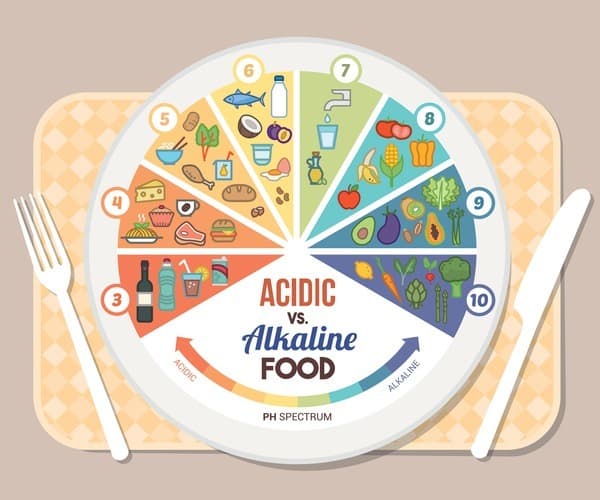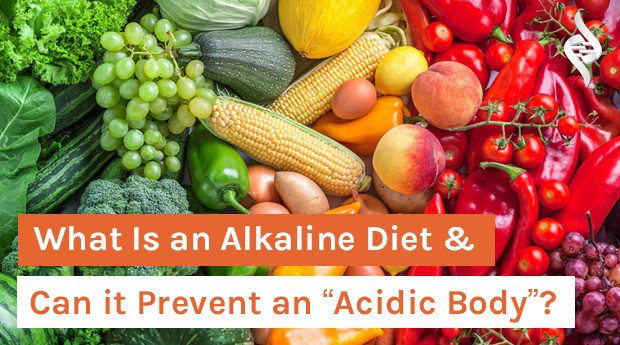What Is an Alkaline Diet & Can it Prevent an “Acidic Body”?
In a hurry? Click here to read the Article Summary...
If you’ve ever gone camping, you probably made a campfire as part of your outdoor adventure. The next morning you might have noticed that the only thing remaining in your fire pit was a pile of white, fluffy ash.
Assuming you didn’t also burn plastic or other contaminants, it might surprise you to learn that this natural wood ash is actually carbon-rich fertilizer in disguise – containing all sorts of nutrients like calcium, lime, and potassium that support a healthy environmental life cycle.

Wood ash, in general, is actually a powerful composting agent. When spread across the soil, it not only makes it more fertile but also contributes to the balancing of its pH (potential of hydrogen) through the neutralization of acid [1].
You’re probably wondering… what do campfires and the nutritive wood ash they create have to do with humans and their dietary habits?
It turns out that understanding the restorative properties of simple wood ash and how it’s created can actually teach us a whole lot about sustaining our bodies.
What Is an Alkaline Diet?
If you’re not familiar with the concept of an alkaline diet (also known as an alkaline ash diet or an acid alkaline diet), it basically involves feeding your body things that naturally help to neutralize disease-causing acidity.
Just like how the burning of wood produces natural, alkaline-forming wood ash for soils, alkaline-forming foods generate their own “ash” byproducts. These byproducts effectively “fertilize” the body’s internal cellular terrain which deters the body from becoming too acidic to the point of causing disease.
In other words, digestion of alkaline-forming foods creates nutritional “ash” that help to balance your body’s pH levels.
Are You Eating an Acidic Diet or an Alkaline Diet?

As you may already know, everything you eat gets broken down through a series of chemical reactions and metabolic processes. This creates base-level nutrients that your body is able to use for the production of energy, the building of muscle, and the perpetual creation of hormones, among other things.
Depending on what you eat, the leftover “ash” that remains after your food is metabolized either contributes to your body’s growth and well-being through alkalization, or its break-down through acidification.
When you consume high alkaline or alkaline-forming foods, you’re essentially adding more “wood” to your internal bonfire – along with nothing else that might cause it to die-out or become polluted.
But when you consume acid-forming foods, it’s kind of like throwing “plastic bottles” on a bonfire. When this trash is done burning, it leaves behind all sorts of toxic waste byproducts that contaminate the leftover “ash” and make it acidic. As a result, it’s unable to properly “fertilize” your body for continued sustenance.
Obesity Can Be a Sign of an Acidic Body
When the body is in a perpetually acidic state (meaning pH levels are too low), all sorts of bad things can happen. For one, internal stores of electrolytes such as calcium and potassium quickly plummet, as the body is forced to rob them from the kidneys in an attempt to raise pH levels back to normal.
Mineral stores in the bones, vital organs, tissues, and cells likewise become depleted, as the body pulls nutrients from where it can in its clamor to achieve acid-base homeostasis.

The loss of these electrolytes and minerals further compromises the body’s ability to absorb vitamins, as these critical absorption cofactors are now in short supply.
This is usually followed by a rapid accumulation of toxins and pathogens throughout the body, as the waste-disposal systems that also rely on these same minerals and electrolytes in order to function struggle to keep up with this toxic onslaught.
One end result of a body that’s too acidic is often obesity, as fat cells are where the body stores both toxins and excess acid.
What Is the Ideal PH of Human Blood?
The human body is programmed to maintain a balanced, slightly alkaline serum (blood) pH level of between 7.35 and 7.45. However, an acid-forming diet greatly inhibits the body’s ability to do so.
The standard American diet (SAD) is an example of an acid-forming diet that packs a one-two punch to your health.
- It lacks alkaline-forming nutrients like magnesium, potassium, and fiber.
- It also contains high levels of acid-forming unhealthy fats, simple sugars, and chemical preservatives.
The result is metabolic acidosis, which can manifest in a variety of horrific ways, most notably as an array of chronic and debilitating illnesses [2]. This is why a growing number of wellness practitioners are encouraging their patients to adopt a high alkaline diet. Eating this way has been shown to help the body more easily achieve that pH sweet spot without having to work too hard, in turn maximizing the body’s wellness potential.
Acidic Foods vs. High Alkaline Foods: Making the Best Dietary Choices
So which foods are alkaline-forming and which are acid-forming? Before answering this question, it’s important to keep in mind that just because a food is acidic in taste doesn’t necessarily mean that it’s acid-forming inside the body.
Acidic Citrus Is Actually Alkalizing Once Consumed

One prominent example of this is citrus fruits like lemons and limes. Despite being extremely acidic, lemons and limes are among the most alkaline-forming foods out there once they’re consumed.
With that in mind, here are the nuts-and-bolts of what you need to know to create a high alkaline diet [3-5] :
Alkaline-forming foods tend to be those that are raw, organically grown, and found in the produce section.
This includes whole fruits and vegetables like beets, spinach, broccoli, artichokes, Brussels sprouts, cabbage, cauliflower, carrots, cucumbers, seaweed, asparagus, kale, radishes, collard greens, and onions, as well as avocados, lettuces, celery, peas, sweet potatoes, eggplant, green beans, blueberries, pears, grapes, kiwis, melons, tangerines, figs, dates, mangoes, and papayas. All of these foods have a net alkaline effect on the body.
Apples, almonds, tomatoes, grapefruits, mushrooms, turnips, olives, peaches, bell peppers, pineapples, cherries, apricots, strawberries, and bananas are also excellent alkaline-forming foods, as is natural spring water, which is generally either slightly alkaline or neutral in pH.
Avoid or At Least Limit Acid-Forming Foods
On the other end of the spectrum are acid-forming foods, which include sodas and pretty much anything that’s processed, as well as alcohol, coffee, sugar, and conventional grains, meat products, eggs, and dairy. Consuming too many acid-forming foods while not exercising regularly and sleeping erratically is a recipe for acidosis. One that’s further complicated by high levels of stress and routine exposure to toxic chemicals.

4 Key Alkaline Diet Benefits
Alkalizing your body appears to have many health advantages. Here are 4 significant benefits to consider:
- One of the first things to happen during acidosis is that the body starts to rob electrolytes and minerals from bones and vital organs. Adopting an alkaline diet is a surefire way to keep these electrolytes and minerals where they’re needed most [6]. The result is that the skeletal system will be less prone to developing osteoporosis or bone loss; the muscular system will remain strong and vibrant; and hormone production, including in the thyroid, adrenal, and pituitary glands, will stay optimized.
- Chronic inflammation, which can affect nearly every system of the body, is another adverse effect of acidosis that can potentially be overcome, or at least greatly minimized, by adopting an alkalizing diet and lifestyle. Everything from the cardiovascular and skeletal systems, to the endocrine and central nervous systems, can thus be improved by getting rid of all that acid – which is great news for people who suffer from chronic pain.
- When the body isn’t having to siphon electrolytes and minerals from vital systems in order to fight acidosis, “powerhouse” nutrients like magnesium, which is needed for hundreds of different enzymatic processes throughout the body, are actually able to do what they were designed to do.
“Activation” of the pro-hormone vitamin D, for instance, can’t happen without magnesium present as a co-factor – meaning people with acidosis are often vitamin D-deficient, and thus have weakened immune and endocrine systems. - Alkaline-forming foods help to combat obesity by modulating leptin levels and revving up the body’s fat-burning mechanisms. By burning these fat stores, alkalization effectively releases all the stored-up acid and other toxins contained in fat tissue, allowing the body to expel them and become even more alkalized.
When the body is in an acidic state, it tries to shield itself from the worst damage by storing excess acid in fat cells. While this might protect vital organs from becoming critically damaged, the resultant changes in body composition can cause other problems, not the least of which is obesity [7].
Cancer, Keto, and the Alkaline Diet
No discussion about an alkaline diet would be complete without addressing the quintessential curse of modern medicine: cancer. Since cancer cells thrive in an acidic environment, many health proponents advocate that alkalizing your body decreases cancer risk. It’s important to note, however, that at this point there does not appear to be any published scientific studies either supporting or disproving this claim.
According to a review published in BMJ Open (British Medical Journal) in 2016, the researchers stated:
Despite the promotion of the alkaline diet and alkaline water by the media and salespeople, there is almost no actual research to either support or disprove these ideas. This systematic review of the literature revealed a lack of evidence for or against diet acid load and/or alkaline water for the initiation or treatment of cancer [8].
Coming up in another article we’ll discuss tips for combining an alkaline diet with the popular ketogenic diet.
Want to nourish your body? Organixx OrganiGreens is a revolutionary organic green juice powder made with 14 sprouted & fermented superfoods and botanicals for maximum nutrition.

 Sources:
Sources:
Article Summary
An alkaline diet (also known as an alkaline ash diet or an acid alkaline diet) involves feeding your body things that naturally help to neutralize disease-causing acidity.
When the body is in a perpetually acidic state (meaning pH levels are too low), it can lead to many health issues.
One end result of a body that’s too acidic is often obesity, as fat cells are where the body stores both toxins and excess acid.
Many health practitioners encourage their patients to adopt a high alkaline diet. This means consuming foods that have an alkalizing effect on the body.
Alkaline-forming foods tend to be those that are raw, organically grown, and found in the produce section.
Acid-forming foods include sodas and pretty much anything that’s processed, as well as alcohol, coffee, sugar, and conventional grains, meat products, eggs, and dairy.



How does fermented foods process in the digestive tract?
Thanks for your question, Aileen!
We would love for you to check out the following materials that extensively discuss about fermented food and supplements:
https://ox2022.organixx.com/fermented-supplements/
https://archive.ox2022.organixx.com/fermentation-secret-free-report/
We hope you found them interesting and helpful. Please let us know if you have other questions, we're here to help!
Good article. Looking forward to the ALKALINE/KETOGENIC article.
Having been on the MUCUSLESS HEALING SYSTEM DIET for several years in my youth, having experienced the ultimate in abundant health, I look forward to what you folks include on the keto diet in getting back to living in abundant health. Please let me know soon. Thank you.
Hi Frances, thank you for your feedback! We are very excited about our next article as well and we look forward to hear what you think about it. If you would like to be notified of our latest articles, promotions, and products, you may sign-up in our free newsletter to be the first to know: https://archive.ox2022.organixx.com/free-health-newsletter/.
Have a lovely day ahead!